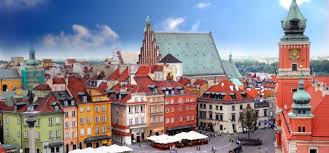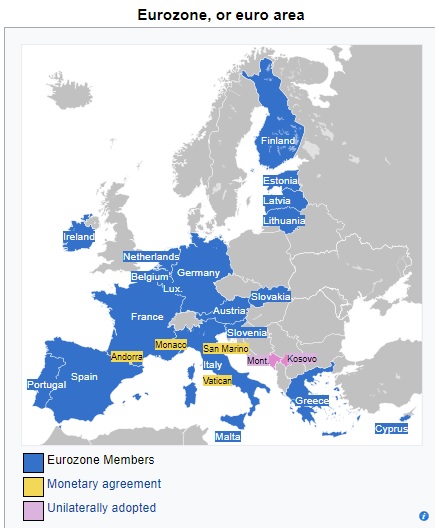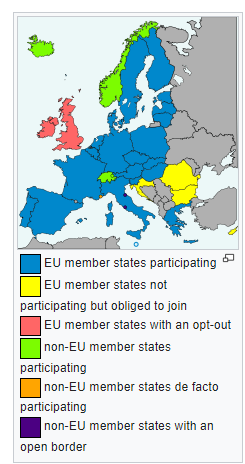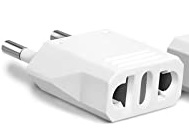



Warsaw, Poland Vienna, Austria Budapest, Hungary
|
|
|
|
|
|
Frequently Asked Questions
1. Money, Eurozone, with exceptions, cashbox,
exchange rates, ATM’s vs. Currency Exchange stations
A: One Euro converts to $1.07 as of June 25,
2024. Five of the countries we will be visiting are in the Eurozone,
with the exceptions being Poland, Czech Republic and Hungary. Euros are
easily obtained from ATM machines, but be sure to alert you will be
using your credit or debit card in the countries we will be traveling,
or your transaction may be blocked. Also, for the best exchange rates,
use bank ATMs, not the currency exchange booths in the airports. For
your convenience, we will maintain a cashbox in the mini-bus for ease in
making small exchanges, especially in the non-Eurozone countries.

2. Passport, Shengen Agreement, Visa?

7. Is English spoken in these countries?
A: English is a common language in these countries, but not everybody speaks English. From time to time it may be necessary for us to ask someone for directions or for help, but I have never found it to be a problem getting around or doing what I wanted to do. Google Maps helps a lot! The Google Translate app is also handy to have on your phone though at times when it might get confusing. And, of course, the assistant tour guide will also speak Russian, a commonly spoken language in these countries that were either in the Soviet Union or dominated by it.
8. What is the exertion level?
We will be doing walking tours in most of the cities - at least one led by a ocal guide, so the ability to walk comfortably is necessary, sometimes perhaps 5 miles in a day. And, as you may be aware, most places in Europe are rarely handicapped accessible so someone in a wheelchair would have some difficulty. For those who cannot walk as much as the walking tours may require, there are Hop On Hop Off options in many of the cities that guests may elect to do. In May 2019, we had two guests who were not a mobile as the rest, but we were able to accommodate them with an occassional taxi ride to limit their need to walk to the next location on our walking tours.
9. What time zones will we be in?
A: The Baltics are 8 hours ahead of Minneapolis, so plan any phone calls carefully! :)
9. How long are the flights to get there?
A: Travel times are long, there's no getting around this negative. I have found that traveling overnight, then doing some activity the day of arrival, followed by a good night's sleep, works pretty well for functioning well on the second day. If you need help selecting a flight, let me know and I can assist you.
10. Will there be Internet available? Can ET call home?
A: Some phone carriers have free Internet data included in their plans when in Europe (T Mobile, for example). Other carriers have international packages you can buy. Check with your carrier. However, you may not need that, as free WiFi is readily available all over Europe (and in all of the hotels we will stay in), so if you can use WiFi Calling, you can call free back home via the Internet. Alternatively, you can arrange to use Facebook Messenger or WhatsApp to make free audio or video calls over the Internet. One guest in May 2019 used Google Fi very successfully, even using its Hotspot to connect to the Internet while traveling in the bus.
11: How big will the group be?
A: The mini-bus holds 19 passsengers plus the driver. With 2 Tour Guides, that leaves 17 seats. We have reserved 8 hotel rooms with two twin beds (and three single rooms), so can comfortably accommodate a maximum of 13 guests (and cancelling what we don't need). With 13 guests plus the tour leader, assistant tour leader and driver, those last four seats are really needed for luggage. Could we fit in an extra? Yes, there is always a way, even if we need to take turns using the less comfortable middle back seat or the jump seat near the driver and get one or two extra rooms elsewhere. But, best not.
12. Who are the tour leaders?
A: Rick Olson and
a student assistant tour guide selected from LCC International
University where Rick taught in 2018.
13. Can we use our normal credit or debit cards?
A: Visa and Mastercard credit cards are readily accepted. Beware, however, that they use the chip card, so a new card may be advised if your current one is not so equiped. You should be sure to have available your PIN as well, as sometimes that is required. And, don't forget to call your credit card company to let them know what countries you will be in and when, or your card transactions will be blocked due to anti-fraud measurs. Oh, and beware of the foreign exchange fees many cards charge. It might be wise to have a card without foreign exchange fees.
14. I am a bit hesitant to travel alone. Can I travel with someone else to and from the tours?
A: That can probably be arranged. Contact Rick Olson and he will try to help you set that up.
15. Will I be met at the airport when I arrive?
A: No. So, we will need to know what flights (or ferries) you will arrive on and when. We will share that information, and between yourselves, you might group up some. Most people take the inexpensive 30 minute train from the Helsinki airport to Hotel Arthur. A taxi is recommended to get from the Tallinn or Budapest airports to the respective hotels. It is advisable to have the address and directions to the arrival hotels in both English and in the language of the country, as not all taxi drivers speak English well. This might avoid confusion and an $84 taxi ride like I had in China.
16. Can I rely on cell phone boarding passes for my flights?
A: Most airlines will be able to handle that, but it is advisable to also have your boarding passes printed. Use the "belt and suspenders" approach to avoid being embarrassed.
17. How safe are these countries to travel in?
A. While no place can be guaranteed to be safe today, the risks of problems is very low. I traveled all over these countries alone with my little backpack, an obvious foreignor, day or night, and never felt at all nervous. And, most of our activities will be in a group, so there is safety in numbers. (And, I did not hear anyone in May 2019, 2022 or 2023 feeling uncomfortable anywhere we traveled, even when walking the cities at night returning to our hotel after a late dinner.) It is best, however, not to have expensive jewelry or other expensive items too visible. There may be pickpockets in some of the southern countries, so keep your wallets and purses (if you carry one, not recommended) in places not easily accessed.
18. How much luggage can I bring?
A: How much luggage would you really want to bring, when we will be moving almost every day on the tours? The mini-bus has room for each person to have a reasonable sized suitcase in the storage area as well as a smallish carryon in the bus itself. Two suitcases would be overkill.
19. What electrical outlets will be available?
A: Note that the voltage and plug configuration are different from the U.S. They use 220 volt, so a converter will be needed for hair dryers, etc. So, if you plan to bring an electric device, you will need to bring a converter or borrow one from another traveler. The outlets are also different, so a style C adapter will be needed. Reasonably priced sets are available on Amazon. Most cell phones and laptops (and also my shaver) will not need a voltage converter (but check to be sure) but the adapter would still be needed.

20. What will the weather be like?
A: In May, the weather should be pretty nice, but rain is always a possibility. Clothes that can be layered are recommended so you can adjust to the temperature. A light poncho may also be more helpful than an umbrella, although the combination is also nice. The Baltics are by the sea, so weather can be variable. In May 2019 and 2022 in the Baltics, we had a lot of light rain, but that did not stop us from being out and about and having a great time!
21. You mention tips
A: Since most of your expenses will be in Euros, you will not need a lot of U.S. currency. Perhaps $200 might be nice, but I expect you will bring most of that home. A stop at an ATM early in the trip is advised to get euros. How much to get? Hmm, if we assume 8 euros for lunch and 20 for dinner, times 12 nights, that would be 336 euros. (One euro converts to about $1.07, but may vary.) There may be some other expenses for trinkets and souvenirs, but I wouldn't start out with much more than 200 euros, as you may use your credit card some as well. We will maintain a cash box to make exchanges in the bus for small amounts, especially in Poland, Czech Republic and Hungary which are not in the Eurozone. It would be inefficient for everyone to have to get the local currency from the ATMs.
23. So, what's the next step?
A: Go to Register and pay a $200 deposit per person by credit card (or send a check to avoid the Eventbrite fees). Send Rick Olson an email (olson48176@gmail.com) to let him know:
-
which tour you are going on,
-
If the trip south, whether you will join us in Helsinki for the optional extra day there. Also, if you wish to stay an additional night in Budapest, Rick Olson can arrange that, so let him know.
-
if you need single occupency (or are willing to get matched up)
-
if traveling with others, who that is, along with their contact information
-
your complete contact information, including phone number, email address and
-
which Rotary Club you are a member of (if applicable).
The remainder of $1700 ($1900 - $200 deposit ) per person tour fee will be due 30 days before the start of the trip. In addition, the additional cost for single occupancy and/or the Helsinki option will need to be paid at that time. For that, a check can be sent to "Rick Olson" at 3051 202nd Ct. E., Prior Lake, MN 55372.
24. Do you have any books you would recommend I read before I go?
A: "Bloodlands: Europe Between Hitler and Stalin", by Timothy Snyder is an excellent book about the region, even if not a real fun book.
"Ashes in the Snow", by Ruta Sepetys is another of the same genre,
telling the story of a young Lithuanian girl sent to Siberia in the
Soviet era.
"Fascism: A Warning", by Madeleeine Albright, especially Chapter 13
regarding Hungary and Poland.
And, if you are really interested,
The Great Courses
has an excellent audio or video course called the "History of Eastern
Europe" that covers the whole range of history of the region. Highly
recommended. We will play the 24 lectures while traveling from city to
city so you will learn a LOT during the tour.
Good suggested reading list from Road Scholar for the Baltic
countries.
25. Are there videos that you might suggest we see?
- Why Tour Eastern Europe https://youtu.be/EuBroHJxnR0
- Introduction to the European Union https://youtu.be/c3G58VBRwhs
- Estonia and Latvia https://youtu.be/87w1ZRTLqN4
- Lithuania https://youtu.be/2kKyWBX6NuY
- Poland and Austria https://youtu.be/pMJEJVoEk78
- Hungary, Slovakia and Czech Republic https://youtu.be/L8118iH-dH8
- Auschwitz The Zazis and the "Final Solution" (BBC) 6 part series.
26. How were the costs of these tours calculated?
See Disclaimer at the bottom of the
Registration page.
27. Do you have a flyer about the tour that I can share with friends?
A: Sure. Here it is or you can download the
2025 update PDF and print.
Let's live the
Global Travelers Rotary motto: "Having Fun.
We